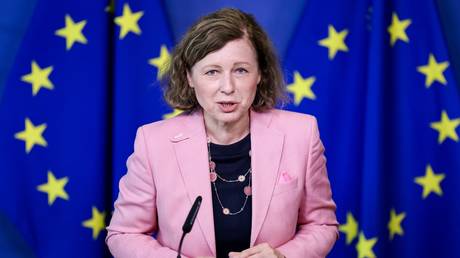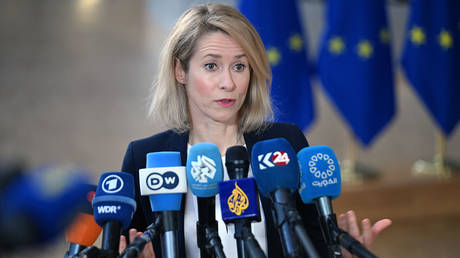
The bloc claims to have objectively evaluated social media platforms using proprietary metrics
X (formerly Twitter) has the worst ratio of disinformation and misinformation to fact-based content of all major social media platforms, the European Union’s values and transparency commissioner Vera Jourova claimed in a speech on Tuesday.
The platform’s level of factual content was supposedly measured using a set of newly created metrics devised by signatories to the EU’s Code of Practice on Disinformation, which X abandoned in May due to differences of opinion on the subject of censorship between the bloc and then-CEO Elon Musk.
“Disinformation actors” also had significantly more followers than their non-disinformation counterparts and had joined the platform more recently, according to Jourova, who admitted the methodology was in a “pilot phase” running in just three EU member states. She shared no further details about how the results were calculated or how disinformation was distinguished from fact-based content.
Jourova warned “very large platforms” – a category that includes X – that they must prioritize information control ahead of upcoming EU elections, reminding them that the Digital Services Act, the EU’s far-reaching internet content moderation legislation, had made aspects of the Code of Practice legally binding starting last month even for platforms that have not voluntarily opted in.
The DSA requires that these platforms implement “reasonable, proportionate, and effective mitigation measures” to manage risks identified by the European Commission and devise reporting and mitigation plans subject to audit and oversight by the Commission.
Jourova declared, “The Russian state has engaged in the war of ideas to pollute our information space with half-truth and lies to create a false image that democracy is no better than autocracy,” demanding social media behemoths step up their participation in the EU’s crusade against Moscow.
NewsGuard, Microsoft’s Pentagon-sponsored disinformation watchdog, also claimed in a report on Tuesday that Musk’s decision to remove the state-backed media labels on accounts affiliated with governments considered unfriendly to the US led to an explosion in disinformation and other nefarious influence operations by those accounts.
Russian, Chinese, and Iranian English-language news media accounts saw a 70% increase in engagement in the 90 days following the removal of the labels, according to the report, which acknowledged that the state-backed media label had suppressed those accounts’ content from search results and warned users who attempted to share it that they were spreading propaganda.
Brussels warned following Musk’s purchase of the company that X would have “huge work” ahead of it to comply with the DSA, insisting the platform then known as Twitter was not “living up to their commitments” to remove so-called hate speech. However, according to a report by the technology publication Rest of World, compliance with government content removal requests has increased significantly under Musk, from 50% before he bought the company to 80% in April.




